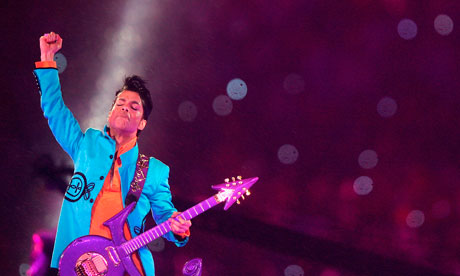
In October 1981, 23-year-old Prince received an invitation to support the Rolling Stones at the Los Angeles Coliseum. Given that he wanted his own band to be "a black version of the Rolling Stones", this was quite the coup. He boldly appeared in his regular stage gear of a trench coat and black underwear. The crowd booed and threw bottles. When his own tour began just weeks later, he abruptly switched to a purple coat, black trousers, white shirt and bow tie.
This tells you two things about the upstart genius from Minneapolis. First, that he had enough maverick confidence to greet a Stones crowd in a trench coat and underwear when, just after the Disco Sucks backlash, rock fans had never looked less kindly on polymorphous perversity. Second, that he was willing to turn on a dime if something wasn't working. He wanted complete creative freedom but he also wanted success and he constantly sweated to reconcile the two goals. Fans relish the gravity-defying moments when it worked, as when the likes of "Kiss" and "When Doves Cry" turned an oxymoron – funk without bass – into miraculous pop. But often it didn't. Even in his 80s pomp, Prince's career was studded with follies and flops. Only in 1984, with Purple Rain, when he simultaneously had the No 1 single, album and movie in America, did he appear bulletproof. But he couldn't even savour that triumph. "We looked around and I knew we were lost," he said. "There was no place to go but down."
Unfortunately for biographers, Prince rarely giftwrapped a quote so neatly. The man whom Purple Rain screenwriter William Blinn drily described as "not conversationally accessible" is a reluctant interviewee who inserts gag clauses in his employees' contracts and leaves writers to puzzle over his contradictions from afar. On the one hand he was, in the 80s, a controlling, insomniac workaholic who drove away countless friends and collaborators; he reportedly told backing musicians Wendy and Lisa that they would go to hell for being gay. On the other hand, he was an enthusiastic talent-spotter who credited his band, the Revolution, on his biggest albums and gave them each a surprise $1m bonus to thank them for Purple Rain.
But isolation won out. He caused outrage by visiting a Mexican restaurant instead of joining pop's great and good at the recording of the charity single "We Are the World". He failed to enlist Madonna's involvement in his disastrous movie Graffiti Bridge. (In a rare instance of sound cinematic judgment, she described his bewildering screenplay as "a piece of shit".) His fierce rivalry with Michael Jackson reached a comic apogee during a ping-pong match in which Prince hit Jackson in the crotch with a power shot and crowed: "Did you see that? He played like Helen Keller!"
There's plenty of juice here, in other words, for a psychologically curious biographer, but Ronin Ro isn't it. Nor is he much of a critic. There's more insight into Prince's music in one chapter of Michaelangelo Matos's slim 2004 volume Sign 'O' the Times than in 356 pages of Ro. And he is blithely uninterested in social context or Prince's own beliefs. "Most American critics felt… [the 1985 song] 'America' contained demagogic red-baiting," he reports. Well did it? And if so, why? He does not elaborate. He is interested in data, not speculation.
Ro's obsession with budgets and sales figures is maddeningly dry when he's dealing with Prince's creative glory days, but it proves better suited to the 90s, when Prince's one-man war against the record industry almost ruined him. Famously, he changed his name to a symbol just as his songwriting discipline was waning, leading Jay Leno to quip that he should call himself "the artist who formerly sold albums". He wasted millions on unstaged tours and unreleased videos; squandered yet more on an erotic stage version of Homer's Odyssey and a "poly-gender fragrance" called Get Wild. One weary fan compared Prince's career to "a gigantic game that only he seems to know the rules to". Ro painstakingly tots up the balance sheet and is tangibly relieved when his hero returns to cultural relevance and financial health with the blockbuster tours of recent years.
You emerge from the final chapter knowing a great deal about Prince's business. But as for the man – challenging, secretive, incorrigible, gifted to a fault – Ro doesn't add much to the 1985 Los Angeles Times report that pondered the artist's peculiar media blackout post-Purple Rain and concluded: "Either he's crazy or he's Prince – or both."
Dorian Lynskey is the author of 33 Revolutions Per Minute (Faber)

